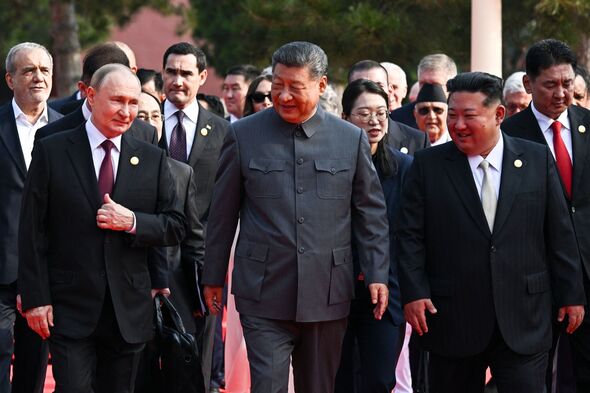Science
Scientist Debunks Claims of Longevity from Putin and Xi Jinping

Claims made by Chinese President Xi Jinping regarding the potential for humans to live to 150 years have been dismissed as “unfounded” by a prominent scientist. The comments were made during a recent military parade in Beijing, where Vladimir Putin was present. Speaking to Putin, Xi remarked that people today often live well past the age of 70, suggesting that advancements could allow for even longer lifespans.
Putin responded by asserting that developments in biotechnology could enable human organs to be continuously transplanted, leading to prolonged life and possibly even immortality. Xi added, “Predictions are, this century, there is also a chance of living to 150.”
Despite their bold assertions, the scientific community remains skeptical. James Markmann, president of the American Society of Transplant Surgeons, criticized the feasibility of such claims. He stated, “There is currently no evidence suggesting that living to 150 years of age is possible through organ transplantation.” Markmann emphasized that while there is interest in aging research, the notion of replenishing organs to extend life is not supported by current medical evidence.
Investments in longevity research are not new. Both Beijing and Moscow have committed substantial funding towards projects aimed at delaying the aging process. The Kremlin has prioritized research on cellular degeneration and cognitive decline, while Chinese initiatives include advancements in nanotechnology and therapies aimed at enhancing the quality of life for older adults.
Markmann’s remarks reflect a broader concern about the unrealistic expectations surrounding organ transplantation and its role in extending human life. He noted, “The concerning idea here is that there is a surplus of organs available that can consistently be replenished for a single individual to prolong their life; this is simply not the case.”
The quest for immortality has pervaded human history, with figures from ancient civilizations to modern billionaires seeking ways to extend their time on Earth. Historical efforts, such as the mummification practices of the ancient Egyptians or the creation of the Terracotta Army by Qin Shi Huang, exemplify humanity’s enduring fascination with life extension.
In contemporary times, a growing movement among tech leaders, particularly in Silicon Valley, has emerged, directing millions towards “biohacking” and cryonics. These ventures aim to push the boundaries of human lifespan further than ever before.
According to Elizabeth Wishnick, a senior research scientist at the Center for Naval Analyses, the pursuit of immortality often reflects a desire among the privileged to transcend earthly limits. She explained, “They want to go into outer space, they want to go underwater… the human body for them is just another frontier.”
As leaders like Xi and Putin speculate on the future of human longevity, the scientific community remains grounded in reality, focusing on achievable advancements rather than unattainable aspirations. The debate over the potential for extended lifespans will likely continue, but for now, the assertion that humans may one day live to 150 remains a topic of skepticism rather than certainty.
-

 Health3 months ago
Health3 months agoNeurologist Warns Excessive Use of Supplements Can Harm Brain
-

 Health3 months ago
Health3 months agoFiona Phillips’ Husband Shares Heartfelt Update on Her Alzheimer’s Journey
-

 Science2 months ago
Science2 months agoBrian Cox Addresses Claims of Alien Probe in 3I/ATLAS Discovery
-

 Science2 months ago
Science2 months agoNASA Investigates Unusual Comet 3I/ATLAS; New Findings Emerge
-

 Science1 month ago
Science1 month agoScientists Examine 3I/ATLAS: Alien Artifact or Cosmic Oddity?
-

 Entertainment5 months ago
Entertainment5 months agoKerry Katona Discusses Future Baby Plans and Brian McFadden’s Wedding
-

 Science1 month ago
Science1 month agoNASA Investigates Speedy Object 3I/ATLAS, Sparking Speculation
-

 Entertainment4 months ago
Entertainment4 months agoEmmerdale Faces Tension as Dylan and April’s Lives Hang in the Balance
-

 World3 months ago
World3 months agoCole Palmer’s Cryptic Message to Kobbie Mainoo Following Loan Talks
-

 Science1 month ago
Science1 month agoNASA Scientists Explore Origins of 3I/ATLAS, a Fast-Moving Visitor
-

 Entertainment2 months ago
Entertainment2 months agoLewis Cope Addresses Accusations of Dance Training Advantage
-

 Entertainment3 months ago
Entertainment3 months agoMajor Cast Changes at Coronation Street: Exits and Returns in 2025









